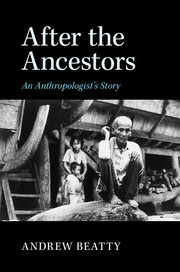Book contents
- Frontmatter
- Epigraph
- Contents
- List of illustrations
- Preface
- People
- Map
- Prologue
- 1 The statue
- 2 House key
- 3 Among women
- 4 Blood brothers
- 5 Daggers and debutants
- 6 Stormy Sunday
- 7 Three things that matter
- 8 The making of great men
- 9 A game of chess
- 10 Cholera song
- 11 Progress
- 12 Brothers and strangers
- 13 Exile and return
- 14 Field work
- 15 The chicken's neck
- 16 Good deaths and bad deaths
- 17 First family
- 18 Blessing
- 19 Half an egg
- 20 Waiting
- 21 Death of a chief
- 22 Ama Jonah at bay
- 23 Unravelling
- 24 The ethnographer and his double
- Epilogue
- Index
7 - Three things that matter
Published online by Cambridge University Press: 05 March 2015
- Frontmatter
- Epigraph
- Contents
- List of illustrations
- Preface
- People
- Map
- Prologue
- 1 The statue
- 2 House key
- 3 Among women
- 4 Blood brothers
- 5 Daggers and debutants
- 6 Stormy Sunday
- 7 Three things that matter
- 8 The making of great men
- 9 A game of chess
- 10 Cholera song
- 11 Progress
- 12 Brothers and strangers
- 13 Exile and return
- 14 Field work
- 15 The chicken's neck
- 16 Good deaths and bad deaths
- 17 First family
- 18 Blessing
- 19 Half an egg
- 20 Waiting
- 21 Death of a chief
- 22 Ama Jonah at bay
- 23 Unravelling
- 24 The ethnographer and his double
- Epilogue
- Index
Summary
The religious teacher, unlike the priest, was local; at least he was born in Orahua even if his parents were from a neighbouring village. The unflattering tag of “incomer” hung around anyone who had arrived within the last seven or eight generations, and I always thought of him as somehow not quite a native. Perhaps it was because he looked a little different from other villagers – his dark frowning face and bristling greasy hair were unlike the sharp-eyed, pale oval of a classic Niha. Even his horn-rimmed spectacles and his gold teeth, now and then flashed in a grin, marked him out as different. And he was rarely called by name – it was always Guru or Guru Agama, the religious teacher. But he was as much an insider as anyone. Of the three main clans in Orahua, he belonged to the smallest, the Ndruru. There was no disgrace in this. He had fellow clansmen in great numbers in the surrounding villages. Besides, the founders of the three clans were brothers, and Ndruru was second of the three.
Although the birth order of the brothers is uncontroversial, there is disagreement about their seniority and about who first settled in Orahua. According to the Bu'ulölö, it was their eponymous ancestor, the youngest born, who proved himself senior by his bravery. It was he who had avenged their father's murder by taking his killer's head. And it was he who had measured the Susua from source to estuary and had built Orahua at the midpoint. That was why the Bu'ulölö now occupied most of the land. The Laia, of course, had their own version: they were the first settlers and had lost ground over the generations to the cannier Bu'ulölö. Even the lower plain used to belong to them: the present chief had obtained it in settlement of debt after Independence.
- Type
- Chapter
- Information
- After the AncestorsAn Anthropologist's Story, pp. 104 - 117Publisher: Cambridge University PressPrint publication year: 2015



